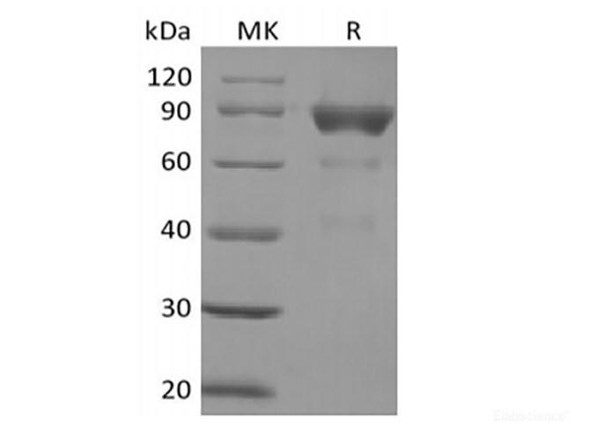Description
| Product Name: | Recombinant Human CD300LB/LMIR5 (C-Fc) |
| Product Code: | RPES6248 |
| Size: | 10µg |
| Species: | Human |
| Expression Host: | HEK293 Cells |
| Synonyms: | CD300b, CLM-7, CLM-7, CMRF35-A2, IREM-3, IREM3, TREM-5, TREM5, CD300LB |
| Mol Mass: | 42.2 kDa |
| AP Mol Mass: | 50-60 kDa |
| Tag: | C-Fc |
| Purity: | > 95 % as determined by reducing SDS-PAGE. |
| Endotoxin Level: | < 1.0 EU per μg of the protein as determined by the LAL method. |
| Bio Activity: | Testing in progress |
| Sequence: | Ile55-His187 |
| Accession: | AAH28091.1 |
| Storage: | Generally, lyophilized proteins are stable for up to 12 months when stored at -20 to -80°C. Reconstituted protein solution can be stored at 4-8°C for 2-7 days. Aliquots of reconstituted samples are stable at < -20°C for 3 months. |
| Shipping: | This product is provided as lyophilized powder which is shipped with ice packs. |
| Formulation: | Lyophilized from a 0.2 μm filtered solution of PBS, pH 7.4. Normally 5 % - 8 % trehalose, mannitol and 0.01% Tween80 are added as protectants before lyophilization. Please refer to the specific buffer information in the printed manual. |
| Reconstitution: | Please refer to the printed manual for detailed information. |
| Background: | CD300LB, also known as CD300b, LMIR5, CLM-7, and IREM‑3, is a glycoprotein member of the immunoglobulin superfamily. LMIR5 is expressed on the surface of myeloid lineage cells. It forms noncovalent cis‑homodimers and cis-heterodimers with other CD300 family proteins, and the composition of these dimers affects the cellular response. Antibody cross‑linking of LMIR5 induces mast cell granule release and cytokine production as well as its tyrosine phosphorylation of LMIR5 (in human). LMIR5 interacts with TIM1 and TIM4 which regulate T cell activation and are themselves binding partners. TIM1 interactions with LMIR5 mediate mast cell activation and the accumulation of neutrophils at sites of TIM1 up‑regulation on damaged renal tubule epithelial cells. Acts as an activating immune receptor through its interaction with ITAM-bearing adapter TYROBP, and also independently by recruitment of GRB2. |






